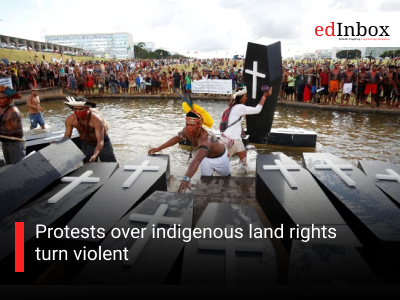The peace march was led by environmentalist and scientist Sonam Wangchuk – a vocal advocate for the application of the sixth schedule in Ladakh, which empowers majority tribal constituencies to formulate their own laws on land use, customs, and development. Ending the march on Mahatma Gandhi’s birth anniversary was a deliberate choice.
Wangchuk is now in jail under one of India's strictest anti-terror laws after a hunger strike he called turned violent, and the permission to accept foreign funding for his organisation was withdrawn abruptly shortly afterwards. Wangchuk has done things that were "prejudicial to the State and prejudicial to the maintenance of peace," Ladakh administration charged in an announcement. Police used bullets and four demonstrators were shot dead when a BJP office was set on fire by some unknown people on September 24. Wangchuk called off his strike and appealed for peace.
"It is unfortunate that it has gone to this," Ali said, speaking to Mongabay India from Kargil district. "Yes, some protestors had behaved out of desperation, but the police response wasinhuman," he continued. The violence on September 24 is the first violent turn that the long-running protests for statehood have taken in Ladakh.
Extended negotiations
In the background of the demand for statehood and sixth schedule status lies an aspiration to reclaim decision-making powers over natural resources in the region. Ladakh has been under the central government's administrative control since it was made a union territory in 2019, with apprehensions of free flow of development and ecological devastation.
Autonomous Hill Councils of Ladakh are given autonomy to manage infrastructure and formulate some developmental activities, but not legislation and establishment of courts. Statehood and sixth schedule status would grant the people of Ladakh rights of self-governance regarding land, forests, cultural practices, and inheritance.
In 2023, the central government formed a High Powered Committee (HPC) and consented to negotiating with Ladakh leaders on several issues, including granting constitutional safeguards to the region. Apart from sixth schedule status and statehood, some of the other grievances by representatives of union territories were Leh and Kargil (the two districts of Ladakh) getting single seats in Parliament and granting government employment.
Weeks after the latest protests turned violent, the Ministry of Home Affairs – under whose jurisdiction the HPC had been formed – released a statement stating "the dialogue mechanism… has yielded good results." The Ministry enumerated better reservations for the Scheduled Tribes, more women reservations in the Autonomous Hill Development Councils, and the protection of local languages as harvests of the bargaining process. The process of recruitment of 1800 government jobs has already started in UT of Ladakh. We are confident that persistent talks would be productive in near future," the Ministry stated.
Talks, however, remained slow on the two key demands of the protests – sixth schedule and statehood. This issue will not end until our demands are fulfilled," chairman of the Leh Apex Body (LAB) Thupstan Chhewang told the press.
Leh Apex Body (LAB) and Kargil Development Association have both suspended further talks until normalcy returns, Wangchuk is released, and a judicial inquiry is called into why the police allowed events to spiral out of control by firing. A magisterial inquiry into firing was announced on October 2.
Decentralising power over land
Sixth schedule status is now only applied to some parts of northeast India under the constitution. Bringing Ladakh under the sixth schedule would require a constitutional amendment, opined Harihar Bhattarcharaya, a Political Science professor at the University of Burdwan. "The demand is real, as the region fulfills the requirements of the sixth schedule, but it entails great constitutional change," he opined. Maybe the government is not acting in a hurry because it will unleash the Pandora's box of demands from other areas where it will have to be implemented as well."
It has over 90% tribal population, and therefore it was a case that necessitated the implementation of the sixth schedule, Bhattacharya put forth. Ladakh's cold desert high-altitude climate also provides habitat to certain peculiar flora and fauna which have been conserved by pastoralist communities like the Changpas.
The state is keen on bringing industrial investments to this land. This year in February, the industry land allotment policy was notified after revision to make the Autonomous Councils' role in allotting land clear as is. One of the prime reasons for the heightened protests is to be provided more authority over land use legislations. Huge tracts of land have been leased out for solar power schemes, reportedly without conducting public consultations.
"Without constitutional protection, the extraction of resources will take place in the manner and scale that will endanger local livelihoods. In three successive years, the trans-Himalayan region has witnessed enhanced precipitation instead of snow, which can lead to flash floods and other hazards. That necessitates good, reflective governance," Himdhara's Asher explained.
Environmentalists targeted
District authorities, including the director general of police, have suggested Wangchuk's involvement in an international criminal conspiracy to cause strife in India – an accusation many branded as confounding. "There isn't a shred of evidence to demonstrate that Sonam Wangchuk caused violence, that's why the government is spinning conspiracy theories. They've arrested him under a law which doesn't require any evidence," political analyst Yogendra Yadav said.
"Is it a crime to mention climate change, melting glaciers, educational reforms and grassroot innovation? To raise voice for the development of an inarticulate tribal belt, ecologically sensitive, in a Gandhian way of non-violence for the last four years? It cannot even be termed as a threat to national security," she wrote in a letter to the Prime Minister and President on October 1.
Protests over indigenous land rights turn violent
Typography
- Smaller Small Medium Big Bigger
- Default Helvetica Segoe Georgia Times
- Reading Mode

